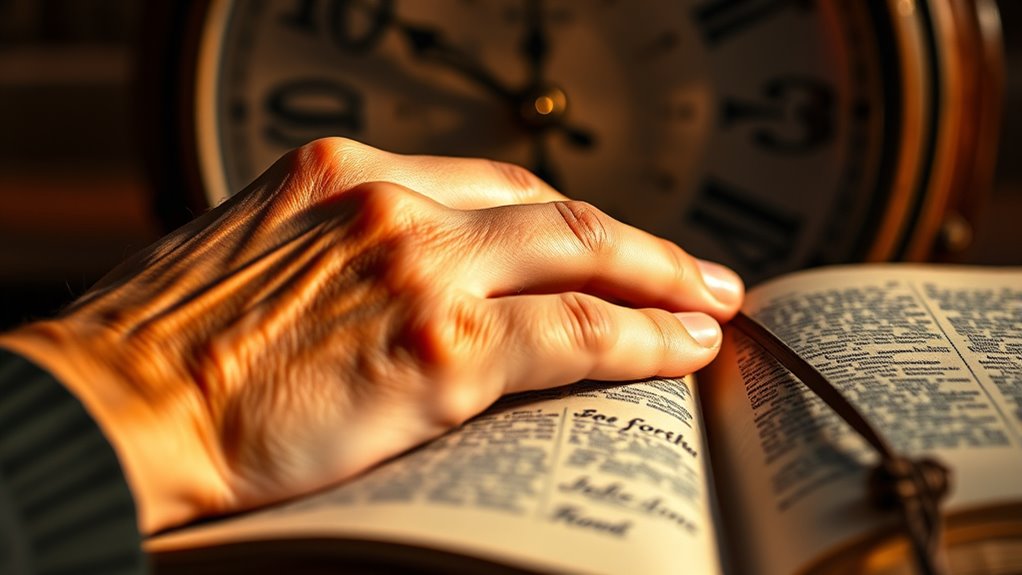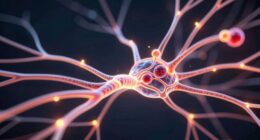As you age, your brain processes less new information and falls into routines, making time feel like it speeds up. When you’re young, every new experience creates rich memories, stretching out your perception of time. As routines dominate, your brain encodes fewer details, causing moments to seem shorter. Changes in brain timing also influence how you perceive durations. If you keep exploring, you’ll discover more about the fascinating ways your mind shapes this common experience.
Key Takeaways
- Older brains process fewer novel stimuli, reducing cognitive effort and making time feel like it passes faster.
- Changes in neural clock mechanisms may slow internal timing, compressing perceived duration.
- Memory density decreases with age, leading to fewer memorable events and a perception of accelerated time.
- Routine experiences require less cognitive processing, causing moments to seem shorter and time to speed up.
- The brain’s evolving information processing and timing mechanisms collectively contribute to the sensation that time accelerates with age.

As you age, it often feels like time speeds up, making days, months, and years seem to pass more quickly. This sensation isn’t just a trick of memory but has roots in how your brain perceives and processes time. One key factor is the perception of duration—how long you feel a stretch of time lasts. When you’re young, a year may seem endless, filled with new experiences and discoveries. But as you grow older, your brain’s way of gauging time shifts, causing those same periods to feel much shorter. This change is closely tied to cognitive processing, which involves how your brain interprets and manages incoming information.
Your brain constructs a sense of time based on the volume of information it processes. When you’re young, your mind takes in a wealth of novel stimuli—new sights, sounds, and ideas—creating a dense “cognitive map” of experiences. This abundance of fresh information makes time feel elongated because your brain is busy encoding and storing all these details. Conversely, as you age, your experiences tend to become more routine, and your brain processes less novel information. Fewer new stimuli mean less cognitive effort is required, which in turn makes time seem to fly by because your brain isn’t registering as many distinct events.
As we age, routine experiences reduce brain activity, making time seem to pass more quickly.
Moreover, the way your brain’s internal clocks work influences this perception. Neuroscientific research suggests that the brain’s timing mechanisms—like neural oscillations and pacemaker-accumulator models—adjust over time. As you age, these internal clocks may run at different speeds, affecting how you perceive durations. When neural processing becomes slower or less responsive, your brain might interpret time intervals as shorter than they actually are. This shift in neural timing reduces the feeling of time dragging, especially during routine or monotonous activities. internal clocks and their adjustments play a significant role in this perceptual change.
Another aspect involves how your memory influences your perception of time. When you look back, the density and richness of your memories shape how long those periods seem in retrospect. Fewer memorable events in later years make time seem to pass swiftly because your brain has less information to reconstruct and compare. This creates a paradox: in the moment, time may feel as normal, but when recalling those experiences, they seem compressed, reinforcing the sensation that time is speeding up.
In essence, your perception of duration and the efficiency of your cognitive processing play fundamental roles in why time appears to accelerate as you age. The brain’s evolving way of handling information, combined with changes in neural timing and memory, makes those fleeting years seem to fly by more quickly. Understanding these neuroscientific processes helps explain the universal experience of time feeling faster as the years go on.
Frequently Asked Questions
Does Perception of Time Vary Across Different Cultures?
You might notice that perception of time varies across cultures due to cultural differences. Some cultures emphasize punctuality and efficiency, making time feel more structured and immediate. Others adopt a more relaxed approach, leading to a different experience of time’s flow. These cultural differences shape how you perceive time, influencing your daily routines and social interactions. Understanding this variation helps explain why time feels faster or slower depending on cultural context.
Can Age-Related Brain Changes Be Reversed?
Did you know your brain has a remarkable neuroplasticity potential? While age-related brain changes can be challenging, recent studies suggest that brain regeneration is possible through activities like learning new skills or physical exercise. Though reversing all aging effects isn’t guaranteed, engaging your brain can enhance neural connections and improve cognitive function. You’re not powerless—your brain can adapt and grow, helping you stay sharp and vibrant at any age.
How Do Childhood Memories Influence Time Perception?
Childhood memories influence your perception of time through memory encoding and emotional impact. When you recall vivid, emotionally charged memories, they tend to feel longer and more detailed, making time seem slower. Conversely, less emotional or routine memories are encoded quickly and feel shorter, causing time to seem faster. Your brain’s way of processing these memories shapes how you perceive the passage of time, especially as you age.
Is There a Link Between Time Perception and Mental Health?
They say, “Time flies when you’re having fun,” but your perception of time is also linked to mental health. When you’re struggling with emotional regulation or cognitive biases, your sense of time can feel distorted—slower during distress or faster when you’re anxious. Your mental state influences how you perceive moments, making time feel different depending on your emotional and cognitive well-being.
Do Animals Experience Time Differently as They Age?
You might wonder if animals experience time differently as they age. As they grow, their biological clocks and sensory processing change, which can alter their perception of time. Younger animals often process sensory information faster, making time seem to pass more slowly. As they age, these processes slow down, causing time to feel like it’s moving faster. So, yes, aging can influence how animals perceive the passage of time.
Conclusion
As you grow older, time seems to slip through your fingers like grains of sand in an hourglass. This sensation isn’t just a trick of the mind; it’s rooted in how your brain processes memories and new experiences. Understanding these neuroscientific theories helps you see that your perception of time is a reflection of your life’s changing landscape. So, cherish each moment like a rare jewel, for time’s river flows faster the longer you stand beside it.









